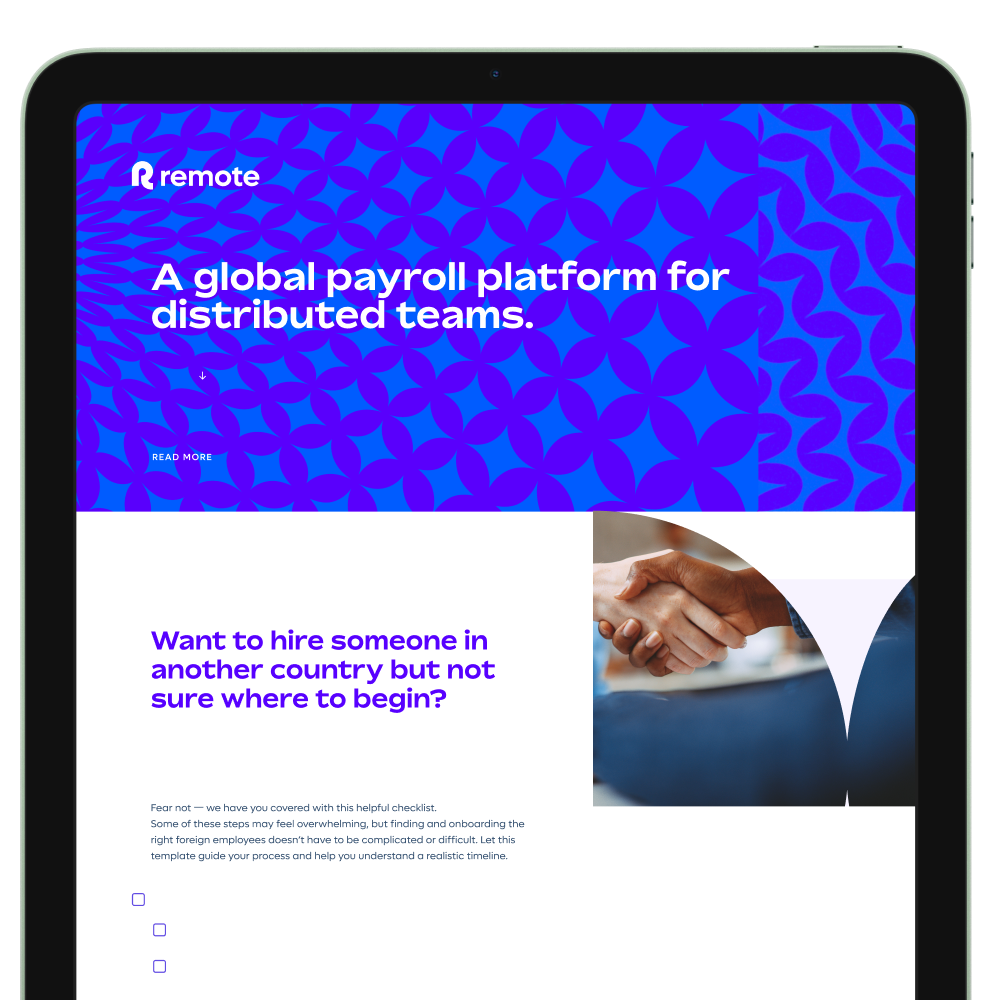
Product Updates — 7 min

Tax and Compliance — 10 min
Working remotely gives employees the opportunity to work hundreds of miles from where they live — not to mention from the comfort of their own homes. It also means a wider pool of potential hires for businesses.
But, like most advantages, that freedom comes with responsibilities.
While taxes for remote workers are usually not more complicated than those for traditional office workers, most educational resources on taxation cater to people in traditional environments.
People who work from home (or nomadically) don’t always have access to the information they need.
This article will help you understand out-of-state remote work tax implications, including which individuals are affected by these laws and your responsibilities as an employer.
Let’s dive in.
Navigating the tax implications of remote work can be a complex process. With the rise in remote work’s popularity, it’s important for remote workers and employers to understand how they’re affected.
The tax implications of working remotely depend on a variety of factors, including the following:
The employee’s place of residence
The employer’s location
The amount of time the employee spends working in each location
The tax implications for remote workers vary from state to state. As the lead manager at AICPA states, “All 50 states have 50 different ideas. There’s no federal solution right now. Every state works different.”
Just like traditional employees, remote workers who work in the same state as their employer are generally required to pay that state’s individual income tax.
However, unlike traditional employees, who typically only have to worry about the tax implications in one state, remote workers who choose to work in a different location from their company may have to pay taxes in multiple states or countries.
Some remote workers decide to relocate to a state with a lower tax rate, like Alaska, in an attempt to save money — only to find that, at tax time, they are forced to pay a double tax rate.
Although working from home is the most popular form of remote work, there are other types, too.
In telecommuting, the employee works from home or another remote location instead of going into the office. In this case, the employer may be required to withhold taxes in both the state where the employee lives and the state in which they work.
An employee may need to travel to a different state for a business trip or to work on a project for a few weeks. Depending on the length of the trip, the employee may be required to pay taxes in the state where they’re working and the state where their employer is based.
While “remote work” is often used as a blanket term, the way a remote employee works can have some important tax implications.
Workers in the United States usually file two types of taxes: state and federal. At the federal level, US workers pay taxes based on where they physically work, not where their employers operate.
State taxes are more complicated.
A person who lives and works remotely in Washington, for example, can perform work for a company that’s based in California without having to pay California state taxes.
However, remote workers who travel to other states and work from there may have to file a nonresident state tax return.
Remote workers don’t have to file nonresident state tax returns unless they physically travel to another state and perform work while they are there.
In certain cases, a reciprocity agreement may protect remote workers from withholding taxes in their work state (where their employer is located) if they live in a different state.
Not all states levy a state income tax. As of this writing, the following states don’t impose an income tax:
Alaska
Florida
Nevada
New Hampshire
South Dakota
Tennessee
Texas
Washington
Wyoming
The state constitution of Texas outright forbids its government from creating a state income tax. Remote workers in these states who don’t perform work in other states only have to file federal tax returns.
Workers in New Hampshire and Tennessee may be subject to state taxes on investments and other income, but these states don’t charge state taxes on wages. Unlike full- and part-time employees, self-employed and contract workers in New Hampshire may be subject to state taxes on their income in certain situations.
For remote workers in the US, physical location remains the determining factor for which taxes workers pay.
Employers who hire employees outside their home states must fulfill their duties to withhold state taxes on a state-by-state basis.
The “convenience of the employer” rule is a tax law that applies to remote workers who work for an out-of-state employer.
Under this rule, if an employee lives in one state but works remotely for an employer based in another state, they are only subject to taxes in the state where they live.
However, there are certain conditions that must be met for this rule to apply.
The “convenience of the employer” test is a set of questions used to determine whether an employee is working remotely for the convenience of an employer rather than their own.
To meet this test, the employer must require the employee to work remotely rather than the employee simply choosing to do so out of their own convenience.
Additionally, the employee mustn’t perform any work in the state where the employer is based.
This rule isn’t mandatory across the United States. In fact, only a few states use it, including the following ones:
Connecticut
New York
Nebraska
Pennsylvania
Delaware
Arkansas
Massachusetts
Companies can hire remote workers from all over the world — so it’s important to know the tax implications of hiring a foreign remote worker.
Every country in the world operates under its own tax code.
Trying to summarize international tax laws in a few paragraphs would be as hopeless as counting grains of sand on a beach.
For now, let’s stick to tax liabilities for remote workers who live outside the United States but work for companies based in the US.
The United States doesn’t levy taxes against non-US citizens living outside the country who work for US-based businesses.
If you’re a citizen of the United States working remotely from another country, you may need to fill out some forms, but usually, you only owe taxes in the country where you live and work.
US citizen high earners (above $100,000 per year) may owe US taxes even while working abroad, though. Either way, US citizens working overseas should still plan to file tax returns, even if they don’t owe anything.
Businesses in the US can’t hire workers in other countries directly.
For a US company to hire a person living abroad, they must either go through the long and difficult process of opening their own local legal entity (which can take months and cost thousands of dollars) or employing the worker using an employer of record, or EOR, such as Remote.
Without an EOR, most US companies choose to treat international employees as independent contractors. This can cause a host of problems for workers and businesses if they aren’t careful.
People who work as contractors must generally be free from restrictions about when they work, how they receive payments, the rates they charge, and whether they can work for multiple companies.
Workers who don’t meet the definition of “contractor” may be considered employees under local jurisdictions.
Misclassification of employees in this way can lead to massive penalties for the offending companies, both within and outside the US.
Both parties should sign a document that clearly outlines the nature of the relationship and regularly evaluate the relationship to ensure that nothing has changed.
People living outside the US who work as independent contractors must remember to save money for their own taxes. Employers generally don’t withhold any taxes from contractors or make payments to government entities on their behalf.
Tax rates for contractors vary from country to country, so contractors should consult local guidelines for specific tax rates and savings tips.
Operating across 25+ countries, TheyDo relies on Remote to navigate the complexities of international employment laws.
Remote ensures compliance with local labor regulations, simplifying onboarding, payroll, and benefits management. This partnership gives TheyDo peace of mind, knowing every hire is legally compliant and risk-free.
With Remote’s expertise, TheyDo has scaled efficiently, reduced compliance challenges, and focused on its mission of fostering collaboration and innovation while confidently managing a diverse, distributed workforce.
“Our customers are fortune 500 brands that have a global presence, so the biggest impact for us is to be able to serve them around the globe. We don’t need to have an entity to serve our customers where they are: Remote gives me a lot of peace of mind that wherever we want to hire someone, it works, and we’re doing exactly everything by the book.” Jochem van der Veer, CEO & Co-Founder
Want to check out Remote in action? Book a demo to see how Remote can transform your business operations.
Remote workers both within and outside the US have several opportunities to limit their tax liability.
Here are a few suggestions:
Know your status as a contractor or employee. Don’t assume the nature of a relationship if you haven’t clarified it in writing. Look up local laws about what distinguishes contractors from employees and ask your employer how you’re classified. Employers who discover they have misclassified a worker must act swiftly to correct the issue.
Familiarize yourself with local tax laws. Countries, states, regions, and cities all have different laws and requirements regarding income taxes. Before you move to a new area and file taxes there, seek information about local laws. Often, employees may find it cheaper and easier to work with a tax professional than to navigate uncharted waters. Employers with international employees and contractors usually need third-party assistance from a PEO or an EOR to stay compliant.
Ask your employer to hire you through an EOR. People who work outside the US as contractors or employees don’t always get the support they need. By offloading payroll, benefits, taxes, and compliance to an EOR, such as Remote, companies can guarantee compliance with local labor and tax regulations while providing a better experience for their international teams.
As an employer, it’s your responsibility to ensure that your remote workers are compliant and meet local tax law requirements.
If you have a remote employee working in another state, it’s important to review the following aspects of that state’s laws:
Tax laws
Payday laws
Deductions
Workers’ compensation
Payroll taxes
Paid leave
Wage and overtime requirements
It’s also a good idea to familiarize yourself with your own state’s tax laws and other regulations that your company might require.
This may sound intimidating, but if you get your tax obligations sorted correctly from the start, compliance and filing become simple.
A hassle-free way to ensure you’re compliant with remote worker tax implications is to use an international payroll processing guide.
Remote has a comprehensive guide available for download that explains how to set up payroll for remote workers, localized services, and contractor payment services.
Following these guidelines can help ensure that you meet all your tax obligations as an employer and avoid any legal or financial penalties.
Work through this checklist to help you stay compliant when you're employing across borders.

People deserve to live and work for great companies no matter where they live.
That’s why Remote exists: we help businesses hire workers all over the world by handling payroll, benefits, taxes, and local compliance.
Check out our countries page to discover all the places we help businesses work with top global talent.
Hiring out-of-state remote workers doesn’t have to be complicated.
While it does require a bit of extra work upfront, once you get the hang of it, you’ll have the freedom to attract talent, no matter where they live.
Hire and pay your global team with Remote and get access to our team of global taxation experts.

Subscribe to receive the latest
Remote blog posts and updates in your inbox.

Product Updates — 7 min

Global Payroll — 2 min

Minimum Wage & Compensation — 7 min

Newsroom — 5 min